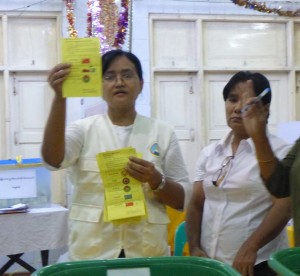Myanmar’s elections: generally free but constitutionally unfair

The Australian delegation to Myanmar’s general elections is pleased to announce that, despite extensive minor irregularities and some pre-election intimidation and political violence, the electoral process has proceeded in a generally free manner and its results are a legitimate expression of the will of its people.
Votes were cast across most parts of the country in a relatively orderly manner. There were numerous minor irregularities, which were expected, but these were not regarded by the Australian team to meaningfully influence the outcome of the vote.
The voter turnout rate was approximately 80 per cent, or below expectations. This turnout rate was consistent with votes polled against voter registration lists at polling stations inspected by the Australian observer team.
Approximately 33.5 million people were registered to vote, with a further four million being unable to register due to disbarment on grounds of loss of citizenship (ethnic Rohingyas), being in conflict or other insecure zones, being overseas (especially guest workers in Thailand) or in some internally displaced persons (IDP) camps.
The Australia Myanmar Election Observer Mission, accredited to the Union Election Commission under Union Aid Abroad-APHEDA, fielded a team of 40 volunteer election observers in six of Myanmar’s seven states as well as an extensive team within Yangon and around the Yangon Region. The team was primarily comprised of previously experienced election observers and Myanmar country experts.
Approximately 200 polling stations were visited by the Australian observer team, including four military polling stations, with teams starting before polling station opening at 6am, visiting other polling stations and then, at the initial polling station, watching vote counting after 4 pm.
Observer team reports consistently noted numerous minor irregularities with polling procedures. These included occasional overcrowding of polling centres, more than one person being behind voting cubicles, one instance of a ballot box not being sealed, some election staff not being properly identified, ‘special’ election police sometimes inside polling stations (although not in ways that interfered with the voting process) and some refusal of entry by observers to polling stations (mostly later granted).
Critically, there were no reports by Australian observers of harassment or intimidation of voters in polling centres. No armed personnel were observed in polling stations. No voters were identified as having been turned away from polling centres.
In Kachin State in particular, one Australian observer team was subject to harassment by state agents. Most polling station centre staff were otherwise friendly and helpful.
Substantive matters such as the sealing of ballot boxes, generally orderly voting processes and lack of external influence were all in compliance with ‘free’ voting procedures. Polling stations opened and closed on time, and vote counting at polling centres was open and transparent.
There were numerous allegations of irregularities prior to the elections, which were to be investigated by the Union Election Commission. Preliminary election results at polling centres indicated that voting intentions were accurately reflected in the outcome of local votes.
As a result, a preliminary assessment by the Australian observer mission concluded that while the election remained deeply compromised by structural issues, including the allocation of 25 per cent of legislative seats to the military, barring the leader of a, possibly the, most popular political party from becoming president and the military and the supra-parliamentary role of the military National Defence and Security Council, the electoral process itself was generally sound.
The Australian observer mission also expressed concern over the unnecessarily layered levels of local, regional, state and national vote counting that not only delayed the announcement of a result of the vote but also created potential opportunity for tampering with an accurate vote result.
The Australian Myanmar Election Observer Mission congratulates the Union Election Commission, and its support from IFES and IDEA, on the conduct of the elections. It also welcomes President Thein Sein’s announcement, on 6 November, that the current government and Myanmar’s military will respect the outcome of the vote.
The Australian election observer mission calls on the international community to hold Myanmar’s government and military to President Thein Sen’s commitment.
